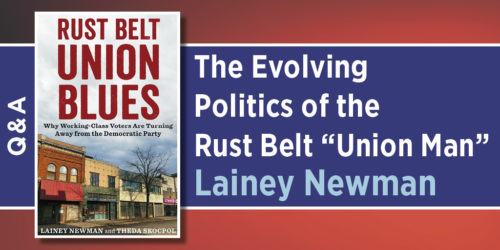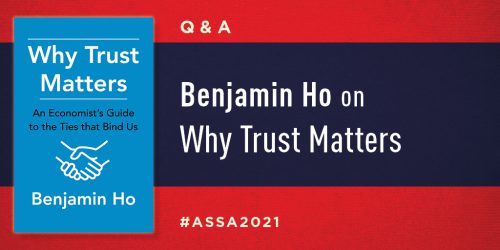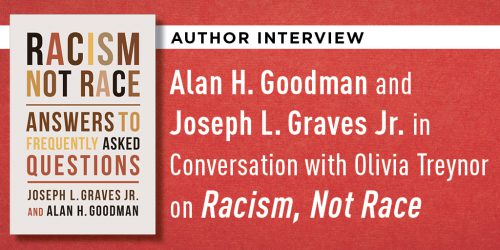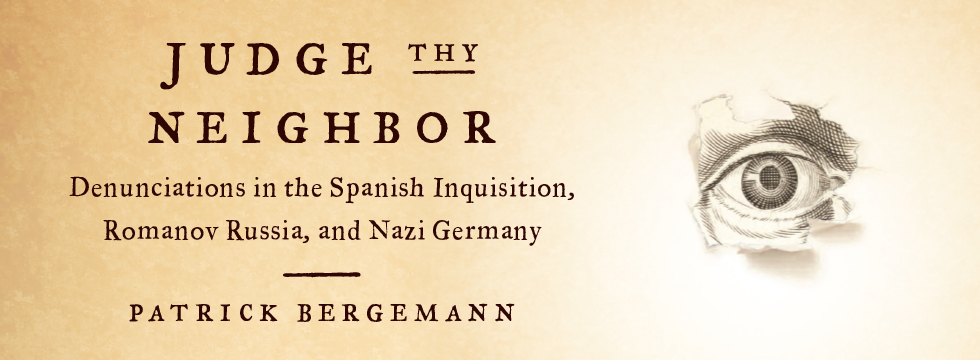Sam Jackson on Oath Keepers
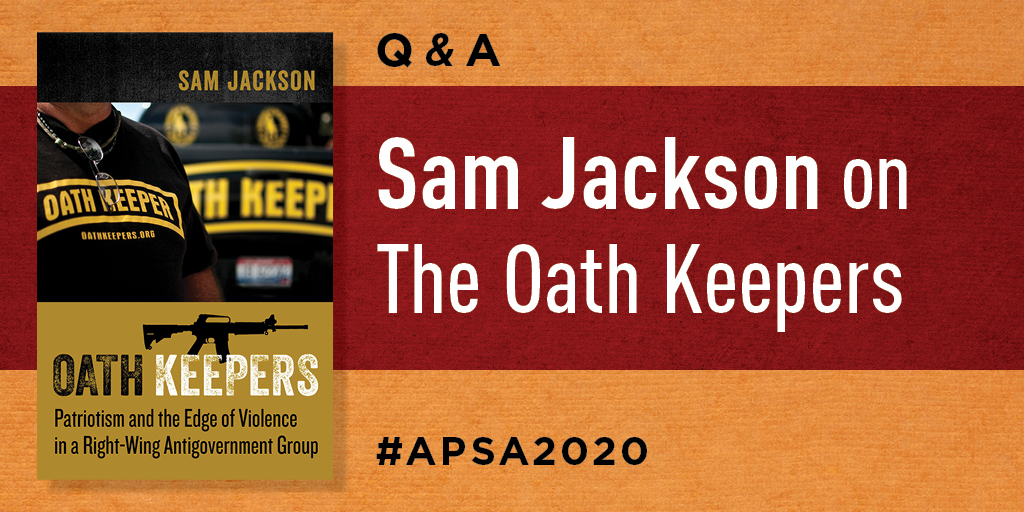
Since 2008, the American patriot/militia movement—right-wing antigovernment groups who portray themselves as fighting encroaching tyranny—has grown exponentially. Among the most visible and vocal of these organizations is Oath Keepers. Formed in 2009, Oath Keepers gained notoriety for its involvement in the Bundy Ranch standoff of 2014 and the Malheur Refuge occupation of 2016. The group gives voice to a recurrent form of American politics: virulent distrust of the government combined with a valorization of violence. The social scientist Sam Jackson takes readers inside the world of the most prominent antigovernment group in the United States, examining its extensive online presence to discover how it builds support for its political goals and actions. Through an extensive textual analysis of the group’s publications, Jackson explores how the group draws on core American political values and pivotal historical moments of conflict and crisis to cast its members as defenders of liberty.
Q: Let’s start very simply. Who are the Oath Keepers?
Sam Jackson: Oath Keepers is an American antigovernment group. It is organized around the belief that America is under threat by people who reject values that the group sees as fundamentally American. The name “Oath Keepers” refers to the oath that members of the military, some politicians, and others take to “support and defend the Constitution of the United States from all enemies, foreign and domestic.” But in practice, the group’s ideas and activities are focused on what they perceive as domestic threats. For most of the group’s short history, these “threats” have primarily come from the federal government. The group calls on people—politicians, current and former members of the military, first responders, and others—to keep the oath to defend the Constitution, and it has even organized oath-swearing ceremonies for those who haven’t taken such an oath before.
That perception of threats led the group to engage in conflicts with government a number of times over the past decade. In Nevada in 2014, the group rallied to support Cliven Bundy in an armed standoff against the Bureau of Land Management. In Oregon in 2015, they mounted a security operation in support of miners who were also in a dispute with the Bureau of Land Management. That same year in Kentucky, the group offered to protect Kim Davis from federal marshals after Davis was jailed for contempt of court when she refused to issue same-sex marriage licenses.
Q: There has been a profusion of far-right movements in the last ten years. How do the Oath Keepers fit in among the rest of them?
Jackson: This is a little tricky, because there are different definitions of “far right.” The second chapter of the book is based on a report I wrote for the International Centre for Counter-Terrorism, and in it I argue that the defining feature of the far right is a desire to change some fundamental features of a political system to restore a lost “golden age” in the past.
There are three main categories of the far right that are active now: the racist far right, the nativist far right, and the antigovernment far right. The racist far right wants to restore an alleged lost golden age when white people (and particularly men) had more power and there were fewer alleged threats posed by other racial groups. The nativist far right wants to restore an alleged lost golden age when there were fewer foreign influences (people, institutions, or ideas) on America. Racism and nativism are both forms of xenophobia, but the identity that is defined as “other” is both less precise and less permanent with nativism. For example, when nativism takes the form of Islamophobia, those nativists might believe it is possible for someone with a Muslim identity to convincingly leave that Muslim identity behind (by converting to a different religion or becoming an outspoken critic of Islam, for instance). The antigovernment far right believes government (particularly the federal government, but also some state governments) is illegitimate, that it has overstepped the bounds set up when America was founded. Antigovernment extremists often talk about resisting government, with force if necessary.
It’s important to recognize these categories as distinct sets of ideas, but in practice there is substantial overlap between them. In particular, many far-right actors hold some ideas that are best understood as racist or nativist and some that are best understood as antigovernment.
The racist and nativist portions of the far right have received the most attention over the past decade, and rightfully so. The so-called “alt-right” and other new forms of white supremacy exploded in 2016 and 2017. But antigovernment extremism—the category that Oath Keepers fits in best—isn’t inherently racist or nativist. For example, the leadership of Oath Keepers has denounced the “alt-right,” and the organization’s bylaws say that anyone who has been part of a racist organization cannot join. But it’s not quite accurate to say that Oath Keepers is free from bigotry. Islamophobia and anti-immigrant sentiment are obvious in some documents produced by the group. And in 2017, chapters of Oath Keepers provided security for rallies held by ACT for America to protest a perceived threat of Islam.
Q: The book is really about how the Oath Keepers conceive of themselves, and how they use historical reference points to build support internally and externally. Which points in American history are the most important to them and why?
Jackson: In the book, I focus on three moments of American history. The first is the most important for the group: the nation’s founding. The group talks about the Revolutionary War and the founding era over and over again. They draw explicit parallels between contemporary Americans who resist an allegedly tyrannical federal government and those would-be Americans who fought against the allegedly tyrannical British government. Oath Keepers uses stories about the Revolution to provide members and those it wants support from with examples of tyranny that must be resisted and with tested means of resistance.
There are also two more recent moments they use to remind members and potential supporters that tyranny can still happen in America: the Waco siege at the Branch Davidian compound in Texas in 1993 led by the ATF and FBI, and the government’s response to Hurricane Katrina in New Orleans in 2005. For Oath Keepers, these were cases where the government wasn’t simply mistaken or unprepared, but was deliberately undertaking action to violate the rights of Americans—and sometimes even to kill them.
Q: What were the methods behind your research? And what sort of methodological problems present themselves when studying groups like this?
Jackson: The data for this research came entirely from the internet and overwhelmingly from the group’s website, blog, and YouTube channels. There are a couple of reasons for this.
First, I decided that I likely could not gain access to prominent people in the group. I reached out to the group’s president, Stewart Rhodes, when I was beginning to plan out the project, and a brief conversation with him made it clear that he wasn’t eager to help me.
Second, the internet has become an important means for all different types of people to share ideas that help them make sense of the world. For Oath Keepers, the internet is a means to spread its message to a wide public, recruiting new members, portraying itself as respectable, and organizing on-the-ground operations. I specifically excluded comments posted by members of Oath Keepers on material posted by the group, and I didn’t try to track down internet-based material about the group posted by others. My goal with this project is to examine how the group presents itself to its members and to a broader public. I was less interested in whether members of the group agree with all of the ideas promoted by the group’s leadership (though that would be an interesting and important project too). The internet activity provided me with rich data.
This approach has limitations, of course, but it allowed me to avoid some of the limitations associated with fieldwork-based research on the far right (and particularly interviews with the far right). For projects like mine, for example, interview-based research requires a certain savviness at designing interviews. You want to reduce the likelihood that you get “talking point” responses that might not be useful or genuine answers. Participant observation of the far right can be effective in studying local groups, but it is much more challenging when studying national organizations or movements that often don’t plan an important portion of their activity ahead of time (like the so-called “security operations” I discuss in the book).
Of course, research based on data from the internet isn’t always appropriate. If researchers want to learn about the processes through which people join far right groups (like with important work by Kathleen Blee or Joel Busher), interviews and other forms of fieldwork are much better methodological approaches.
Q: Today we see a strong antigovernment strain reemerging to protest pandemic lockdowns and mask wearing. Do you think groups like the Oath Keepers will fold this into their activism?
Jackson: Absolutely. One of the common themes of antigovernment extremism is distrust of elites in general, including established researchers and public health authorities. And when groups like Oath Keepers see advice—or legal requirements—about behavior to try to slow the spread of COVID-19 that they interpret as violating their rights as Americans, they will speak out or demonstrate against it.
I saw this myself at the end of May. A tattoo shop in the Hudson Valley in New York announced that it would reopen, which was in violation of the state’s pandemic guidelines. The owner of the shop is affiliated with Oath Keepers, and the group announced that it would hold a rally outside as the shop opened. There were a couple of speeches by those demonstrating, and they framed the shop’s reopening as a defense of freedom and resistance to tyranny. Most of the folks weren’t wearing masks. I was watching the crowd from across the street. At one point, one of the demonstrators came over and tried to shake my hand; I declined because of COVID. He said, “You know it’s just a seasonal flu, right?”
This is an example of a feature of antigovernment extremism (and other forms of politics in America that could be understood as radical libertarianism) that I don’t really discuss in the book. The world faces many problems that affect communities and not just individuals: climate change, disease, and violent conflicts, to name a few. Radical libertarians tend to advocate for individual action and communal action that is purely voluntary. But distrust of authorities means that some of them don’t acknowledge the existence of community problems that require community responses, which means they won’t voluntarily agree to communal action.
Pollution is another example of this. Oath Keepers has a number of articles on its website railing against regulations related to wood-burning stoves. The authors of those articles argue that the government has no business telling you how to heat your home or cook your food. But burning wood releases pollutants into the air, and the people who choose to burn wood aren’t the only people who breathe the air. The effects of using carbon fuel sources aren’t limited to those who actually use those fuel sources—there are clear community-level outcomes. Regulating the types of filters that must be used in wood-burning stoves isn’t just about changing the stove owner’s life, it’s about changing the lives of everyone around where they burn the wood. But radical libertarians either ignore or do not recognize the broader consequences of individual behavior like this. Nor do they appear to recognize the broader consequences of decisions about whether to wear a mask in public.
Categories:American Political Science AssociationAuthor InterviewPhilosophyPoliticsVirtual Exhibits
Tags:American HistoryAmerican MilitiaAmerican Sociological Association 2021AntigovernmentAPSAAPSA 2020Constitutional RightsFar Right extremismfar-rightFar-right ideologiesInform Your VoteMilitia MovementOath KeepersSam Jackson

